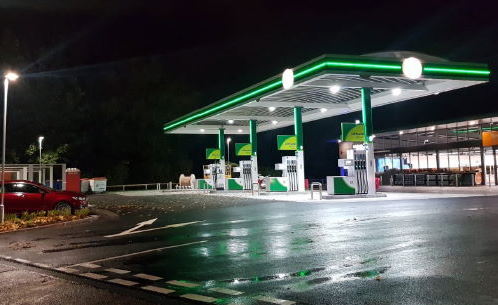ULTILOW
Rubber Modified Asphalt delivers enhanced sustainability
Garage forecourt, Stoke on Trent

Client
Euro Garages
Contractor
NMC
Location type
Garage forecourt, Stoke on Trent
Completion
September 2020
The challenge
An existing BP filling station was to be developed by Euro Garages to transform it into a service station to serve the local community. The new amenities included a shop, pharmacy, bakery, ATMs as well as new fuel pumps, jet wash and electric car charging points. The development would also generate around 25 new jobs. Given the high local profile and the sustainable nature of the project, the client was keen that the project met the highest possible standards of sustainability.
Our solution
After detailed consultation with the client, Ultilow and rubber modified asphalt were recommended as a solution.
It was proposed the base and surface course materials would be supplied in Ultilow. Ultilow is a range of low temperature asphalts, manufactured and supplied to comply with TRL Report PPR 666, within the ‘Warm Mix’ category. These asphalts are typically around 40 degrees lower in temperature than conventional hot mix equivalents. Ultilow asphalts use proven technology to ensure that the material supplied performs as well as conventional hot asphalts, but with the added benefits of enhanced workability, improved sustainability and earlier reopening times to traffic and other construction activities.
Tarmac proposed to supply the surface course in Rubber Modified SMA designs. The stone on stone structure of SMA gives good resistance to rutting and deformation and the addition of recycled crumb rubber into the mix enables a bitumen rich design giving extended pavement life and a use for a previously problematic waste stream of old tyres. There are around 40 million waste tyres generated per year in the UK, despite small scale recycling ie. Fueling Tarmac’s cement kilns and other smaller industries, 1 in 4 tyres are still exported mainly to Asia. However, the rubber modified asphalt contains roughly one tyre per tonne of asphalt or 500 waste tyres per kilometre of highway.
Results and benefits
Around 100 tonnes of Ultilow asphalt base and a further 118 tonnes of rubber modified asphalt was laid over a five-day period. All the rubber modified asphalt was produced in Ultilow. With lower energy requirements during production and a smaller carbon footprint the material helped the client to achieve a more sustainable outcome for this project. It also helped to minimise programme times and disruption to reduce costs and deliver value.
Additional info
Gary Fraser – Roads Project Engineer Clackmannanshire Council
Sustainable Rubber Modified Asphalt is just one of the many sustainable solutions from Tarmac. The development of Rubber Modified Asphalt is part of our commitment to the circular economy, with the business recycling 8.7 million tonnes of waste from other industries every year. With lower carbon emissions the typical carbon footprint of Tarmac’s Rubber Modified SMA solution are around 8% lower than the equivalent conventional SMA.
